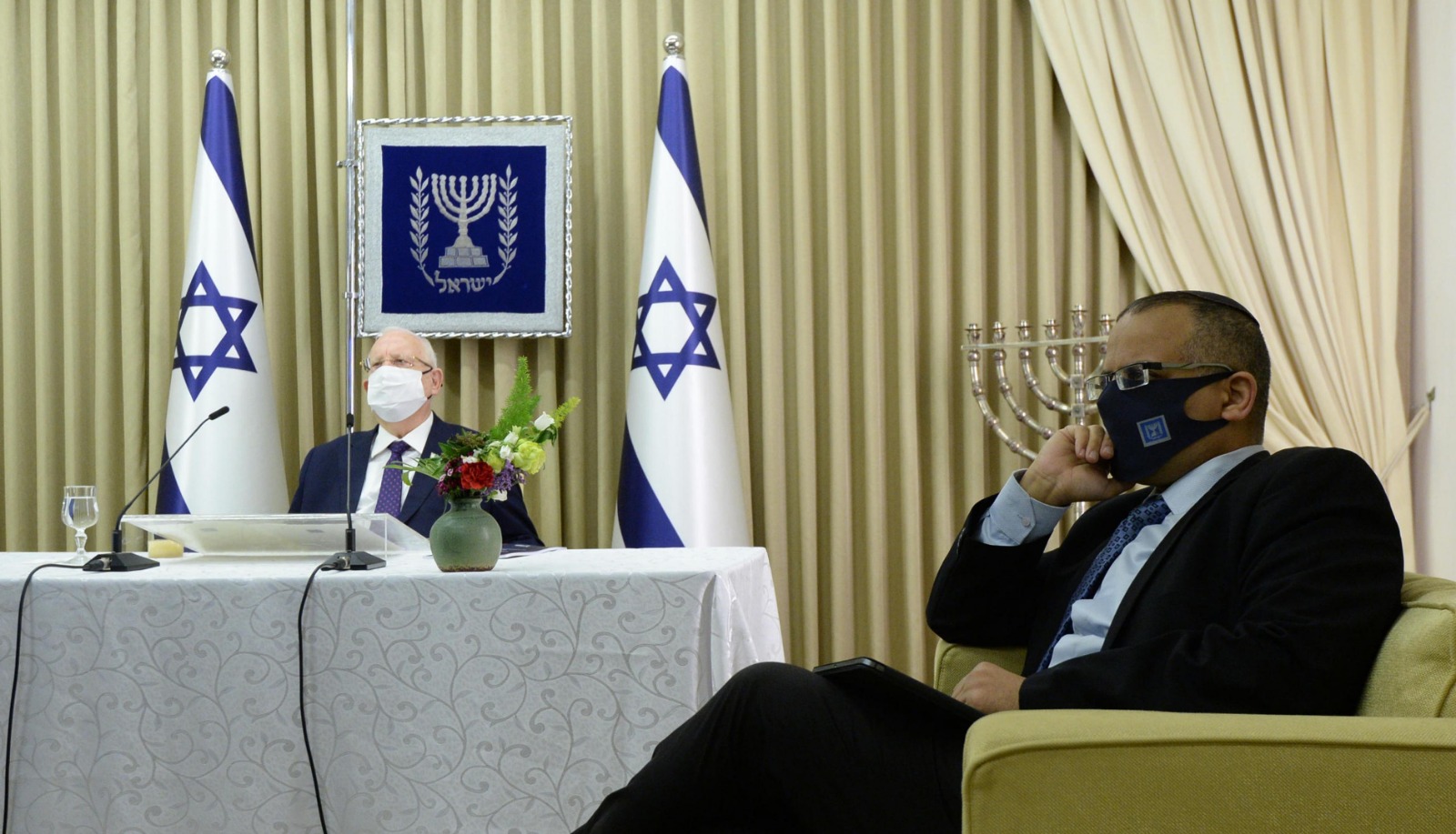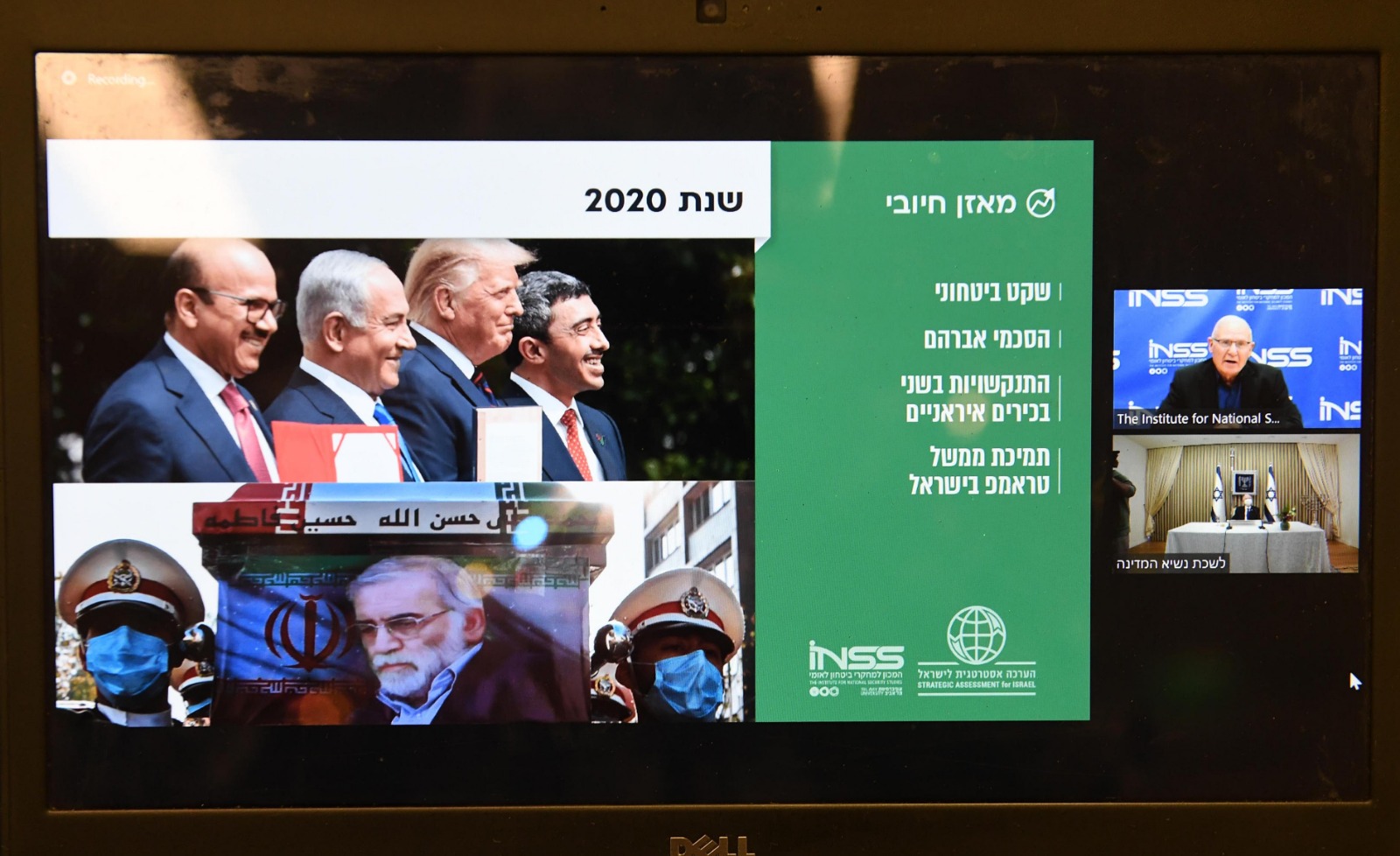President Rivlin Receives INSS 2021 National Assessment
January 6, 2021
On Wednesday, January 6, 2021, senior figures from the Institute for National Security Studies (INSS) presented the Strategic Survey for Israel 2020-2021 to the President of the State of Israel, HE Reuven (Ruvi) Rivlin.
President Rivlin said at the event: "The editors point out in their opening overview that ‘in addition to outlining the challenges facing the State of Israel, the possibilities for addressing them must be examined.’ Here [they] imply that there is a response to the threats. Intrinsic to every threat us the inception of, and hope for, a new opportunity. I noted earlier the great state of uncertainly – especially this year. Uncertainty always heralds risks, but also opportunities and new openings. We should contend with the risks, and take advantage of the opportunities. In this regard, I want to make two observations that are essentially one and the same. The first relates to the urgent need to restore trust between the Israeli citizenry and the state – trust that has suffered serious, perhaps even mortal blows over the past year. The second observation relates to the coming elections and the ongoing political and social rift. This will be the fourth election cycle in two years, and my last as President. Assuming the public health threat to us is eliminated, and I hope this will be the case, Israeli society will be in urgent need of a stable, functioning government that will address, first and foremost, economic recovery, social polarities, and the rift – the great rift – within Israeli society, among fellow citizens. It will have to tackle the needless hatred undermining the foundations of our national resilience. Should a stable government not arise, the duty and responsibility will fall on the shoulders of the Knesset members, from all parties, to present the citizens of Israel with a legislative or political solution following the emergence from the protracted crisis."
The president said in conclusion: "This publication is important for the resilience of Israeli democracy in that it is a report that is public and is accessible to all. May the Institute's staff continue to minister to the State of Israel's resilience with devotion, wisdom, and courage through their research, all guided by love and the desire to advance our country and society."

Maj. Gen. (ret.) Amos Yadlin, Executive Director of INSS, said in his presentation: "Israel, at the dawn of 2021, is a strong country that wields military, diplomatic, technological , and economic power, notwithstanding the coronavirus crisis. At the same time, Israel is in the midst of a multi-faceted internal crisis that includes challenges to public health, the economy, society, politics, and governance. This complex crisis, which has been exposed by the coronavirus pandemic, is liable to undermine the foundations of national security in its broad sense, as it leads to a weakening of state systems and institutions."
"For the first time since INSS began publishing an annual ranking of threats, the internal threat has been ranked in our experts’ survey as among the three leading threats to Israel's national resilience and security," Yadlin stated. He added: "Despite the grave internal threat, there should be no illusions about the external threats having disappeared, and it is possible that there will be national security events that lead to unplanned escalation. The likelihood of Israel encountering an external security challenge in 2021 is not low." The Institute’s Director deemed a "first northern war" the gravest threat that Israel faces at the outset of 2021. "The next war in the north will not be limited to one theater," he stressed.
Regarding tensions with Tehran, he said: "Iran has a ‘score to settle’ with Israel, and it is possible that Tehran will act aggressively, mainly via proxies, reckoning that the Biden administration will be restrained in its response and likely ease the 'maximum pressure' imposed on it. Israel should prepare for the anticipated dialogue about a new nuclear deal and for defining Israel's vital interests within that framework. Israel should continue its activity against Iranian entrenchment in Syria and against the precision missile project that Iran is orchestrating in the region, and create a credible offensive option against Iran."
Regarding the Palestinian issue, Maj. Gen. (ret.) Yadlin said: "While the Palestinian problem has not disappeared, Palestinian means of applying leverage and pressure have lost some of their potential. A stabilization of security quiet should be pursued, along with an improvement of conditions for the population and the civil infrastructure. A possible dynamic of escalation exists in Gaza. In the event of a confrontation, Israel should deal a heavy blow to the Hamas military wing."
The INSS Director concluded the discussion with remarks about the normalization process between Israel and Arab countries, saying: "From a regional standpoint, the Abraham Accords and normalization with the United Arab Emirates, Bahrain, Morocco – and possibly other countries down the line – are strategic tidings of the utmost importance, having a positive impact on both the national-security level and the economic level. Actions should be pursued in hope of continuing the trend, with a possible future signing of a normalization deal with Saudi Arabia, which would have far-reaching ramifications."

The INSS annual assessment includes the main points of an analysis of Israel’s strategic environment from the perspective of national security, including the threats and opportunities facing the country, and offers policy recommendations for decision makers. INSS experts presented the leading security and political issues facing Israel at the outset of 2021 to the President. Based on this analysis and a forecast of the national security challenges, INSS outlined a grand political and security strategy for confronting the threats facing Israel.
A full and detailed discussion of the principal insights of the Strategic Survey will take place in the framework of the INSS 14th Annual International Conference on January 26-28 in Tel Aviv.


